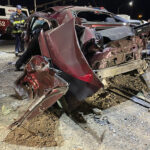Munich Re, working with Aon, has arranged a securitization for Japanese insurer Zenkyoren, the National Mutual Insurance Federation of Agricultural Cooperatives, through Muteki Ltd., an exempted company in the Cayman Islands, to transfer Japanese earthquake risks to the capital markets. “The placement provides Munich Re with fully collateralized catastrophe protections for Japanese earthquake risks,” said Munich Re’s bulletin. “The securitization gives Zenkyoren cover against losses in the event of devastating earthquakes in Japan.”
Munich Re explained: “The risk transfer is so designed that the protection level for Zenkyoren increases after the occurrence of moderate earthquakes that do not fully trigger the bond (so-called ‘drop down events’), thus accommodating the increased protection need of Zenkyoren after moderately severe events. Investors will in turn be rewarded with a higher risk spread (‘step-up risk premium’) in such a situation in order to avoid mark-to-market losses.
Aon announced that Aon Re Global’s investment banking group, Aon Capital Markets, had successfully completed the private placement of the $300 million of principal at-risk variable rate notes for Muteki Ltd. The placement occurred outside of the U.S., and the securities involved have not been registered for public sale in the U.S.
The notes issued by Muteki Ltd. “have a term of three years and have been given a Ba2 rating by Moody’s,” said Munich Re. “The risk spread payable to investors is 4.40 percentage points above the three-month Libor, while the additional step-up risk premium after a drop-down event is 3.5 percentage points.”
AIR Worldwide Corporation provided the risk modeling and analysis for this transaction, Aon noted. It will also act as Calculation Agent. “The transaction was structured with a parametric index trigger, providing recoveries based on the location and peak ground acceleration of earthquakes as reported by strong motion seismographs at approximately 1,000 K-NET stations.”
Sources: Munich Re – www.munichre.com and Aon – www.aon.com
Was this article valuable?
Here are more articles you may enjoy.

 Supplemental Claims Don’t Need to Include Damage Estimates, Fed Appeals Court Says
Supplemental Claims Don’t Need to Include Damage Estimates, Fed Appeals Court Says  EVs Head for Junkyard as Mechanic Shortage Inflates Repair Costs
EVs Head for Junkyard as Mechanic Shortage Inflates Repair Costs  Report: Vehicle Complexity, Labor ‘Reshaping’ Auto Insurance and Collision Repair
Report: Vehicle Complexity, Labor ‘Reshaping’ Auto Insurance and Collision Repair  Texas Among Several States Facing New Fire Risks: Weather Watch
Texas Among Several States Facing New Fire Risks: Weather Watch 